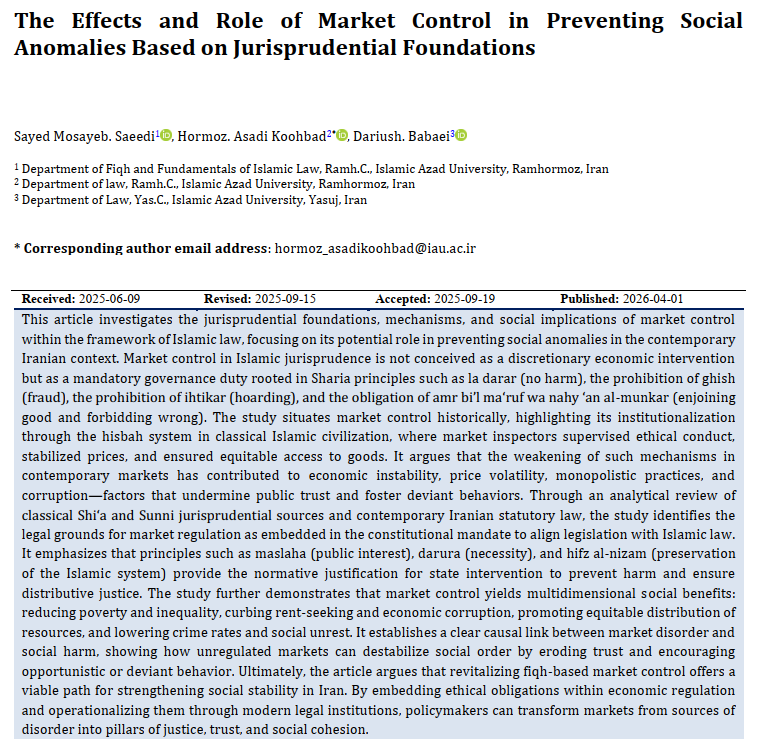The Effects and Role of Market Control in Preventing Social Anomalies Based on Jurisprudential Foundations
Keywords:
Market control, Islamic jurisprudence, social anomalies, economic justice, market regulation, hisbah, poverty, corruption, distributive equity, IranAbstract
This article investigates the jurisprudential foundations, mechanisms, and social implications of market control within the framework of Islamic law, focusing on its potential role in preventing social anomalies in the contemporary Iranian context. Market control in Islamic jurisprudence is not conceived as a discretionary economic intervention but as a mandatory governance duty rooted in Sharia principles such as la darar (no harm), the prohibition of ghish (fraud), the prohibition of ihtikar (hoarding), and the obligation of amr bi’l ma‘ruf wa nahy ‘an al-munkar (enjoining good and forbidding wrong). The study situates market control historically, highlighting its institutionalization through the hisbah system in classical Islamic civilization, where market inspectors supervised ethical conduct, stabilized prices, and ensured equitable access to goods. It argues that the weakening of such mechanisms in contemporary markets has contributed to economic instability, price volatility, monopolistic practices, and corruption—factors that undermine public trust and foster deviant behaviors. Through an analytical review of classical Shi‘a and Sunni jurisprudential sources and contemporary Iranian statutory law, the study identifies the legal grounds for market regulation as embedded in the constitutional mandate to align legislation with Islamic law. It emphasizes that principles such as maslaha (public interest), darura (necessity), and hifz al-nizam (preservation of the Islamic system) provide the normative justification for state intervention to prevent harm and ensure distributive justice. The study further demonstrates that market control yields multidimensional social benefits: reducing poverty and inequality, curbing rent-seeking and economic corruption, promoting equitable distribution of resources, and lowering crime rates and social unrest. It establishes a clear causal link between market disorder and social harm, showing how unregulated markets can destabilize social order by eroding trust and encouraging opportunistic or deviant behavior. Ultimately, the article argues that revitalizing fiqh-based market control offers a viable path for strengthening social stability in Iran. By embedding ethical obligations within economic regulation and operationalizing them through modern legal institutions, policymakers can transform markets from sources of disorder into pillars of justice, trust, and social cohesion.
Downloads
References
Abrosh, M., & Jabari, R. (2016). Market Control Strategies in the Managerial Seerah of Imam Ali (AS). Journal of Islamic Jurisprudence and Law.
Amin-Naji, M., & et al. (2022). Establishing Economic Justice in the Market System Based on Nahj al-Balagha Teachings. Journal of Islamic Economics.
Ansari, S. M. (1981). Al-Makasib. Dar Ihya al-Turath al-Arabi.
Bhargava, V. (2005). Corruption and Market Governance. World Bank Publications.
Chapra, M. U. (1992). Islamic Economics: Theory and Practice. Islamic Foundation.
Choudhury, M. A. (1992). Principles of Islamic Political Economy. Macmillan.
Chriss, J. J. (2013). Social Control: An Introduction. Polity Press.
Goode, E. (2020). Deviant Behavior. Routledge.
Jamrozik, A. (2009). The Sociology of Social Problems. Cambridge University Press.
Khomeini, R. (1979). Islamic Government (Hokumat-e Islami). The Institute for Compilation and Publication of Imam Khomeini's Works.
Khomeini, R. (1985). Al-Tahrir al-Wasila. The Institute for Compilation and Publication of Imam Khomeini's Works.
Mahdavi-Hampa, H., & et al. (2019). Mechanisms of Social Control Based on Shiite Jurisprudence. Journal of Islamic Law and Jurisprudence.
Majlisi, M. B. (1983). Bihar al-Anwar (Vol. 22: Transactions). Dar Ihya al-Turath al-Arabi.
Maxwell, S. R. (2015). Poverty and Crime. Routledge.
Mirakhor, A., & Iqbal, Z. (2017). The Islamic Moral Economy: A Framework for Islamic Finance. Routledge.
Mohammadiari, H. (2015). Jurisprudential and Legal Foundations of Market Regulation by the Islamic Government. Journal of Public Law Thoughts.
Mughniyya, M. J. (1998). Qawa'id al-Fiqh. Dar al-‘Ilm lil-Malayin.
Muhaqqiq al-Hilli, N. a.-D. (1983). Shara’i al-Islam. Dar al-Ahya al-Turath.
Najafi, M. H. (1984). Jawahir al-Kalam. Dar Ihya al-Turath al-Arabi.
Rasouli, A., & et al. (2021). Jurisprudential and Legal Bases of Criminalization in the Capital Market. Journal of Economic Law.
Rouhani, S. (1995). Fiqh al-Sadeq. Dar al-Kutub al-Islamiyya.
Sachedina, A. (1988). Public Duties in Islam: The Institution of the Hisba. Oxford University Press.
Sadr, M. B. (1982). Iqtisaduna. Dar al-Ta'aruf.
Saleem, M. Y. (2013). Islamic Commercial Law. Wiley-Blackwell.
Zuhayli, W. (1997). Al-Fiqh al-Islami wa Adillatuh. Dar al-Fikr.

Downloads
Additional Files
Published
Submitted
Revised
Accepted
Issue
Section
License
Copyright (c) 2025 Sayed Mosayeb Saeedi (Author); Hormoz Asadi Koohbad (Corresponding author); Dariush Babaei (Author)

This work is licensed under a Creative Commons Attribution-NonCommercial 4.0 International License.





